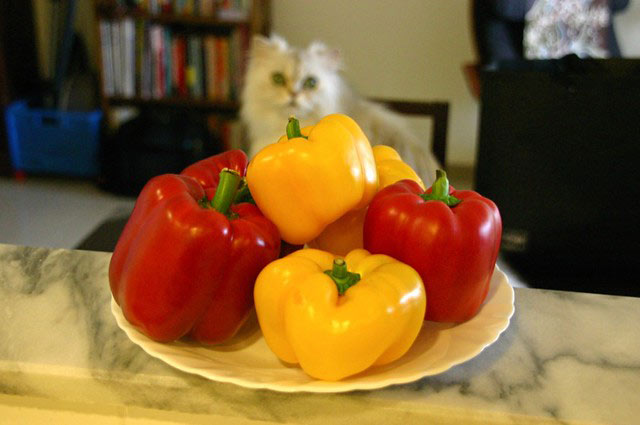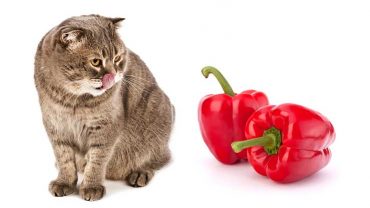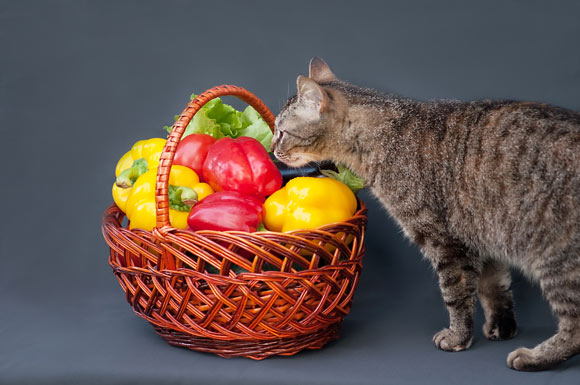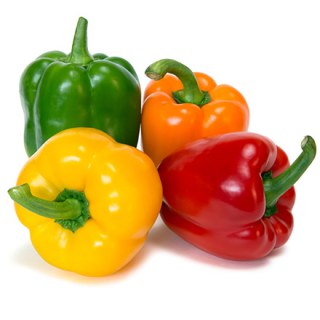Bell pepper is the fruit of the flowering plant whose genus name is ‘Capsicum annum’. It has a variety of uses such as being consumed as food, spices, or for medicinal purposes. There are various types of fruits that are found under Capsicum. Several fruits under Capsicum have an active component termed capsaicin. This component while, having numerous health benefits, causes a burning sensation when ingested in high amounts. It is particularly non-tolerable to animals that have a sensitive digestive system.
Chilli peppers have a high content of capsaicin while, bell peppers do not contain it. This makes it possible for your feline friends to consume it, and for you to not panic. Bell peppers are not toxic to cats and, can be consumed albeit in small quantities.
Bet you did not think that your feline partner is an obligate carnivore, did you? Well, Cats are obligate carnivores. This means that they do not have the necessary physiology to digest plants or foods derived from plants. Cats need meat for their survival and bell pepper doesn’t exactly find a spot in their dietary requirements.

The health benefits provided by a bell pepper while particularly beneficial for humans do not do as much for your furry friend. The nutrients found in the bell pepper are not needed by your cat as its body is equipped to produce it on its own.
The most important question that is likely to go through a cat owner’s mind is – Can cats eat bell pepper? The answer to this is rather simple. Yes, your feline partner can consume bell pepper and it is not toxic. But, it is more likely that your cat won’t want to eat it. It is not exactly appealing to cats. It doesn’t fit with their eating style and, it doesn’t have the taste or the flavor to go with it.
Health benefits of bell peppers

Bell peppers are undoubtedly nutritionally beneficial for humans. But the question you should be asking is- are they beneficial for cats? The answer is not so simple. While bell peppers do not need to be included in the diet of your cat, it still has some positive impacts on your feline partner. Some of these are:
Anti-oxidants

Bell peppers contain large amounts of antioxidants which, are particularly useful in eliminating the free radicals. The various compounds of anti-oxidants play a major role in the blockage of the proliferation of cancerous cells. Cancer is as dangerous to cats as they are to humans.
Besides helping in reducing the risk of cancer, the anti-oxidants found in bell pepper also prevent a variety of diseases in cats. It helps to prevent heart attacks. Your cat has a heart attack is equivalent to you having one. So, keep a close eye on your pet and monitor their diet.
Not only your grandmother, but cats can have dementia too. The anti-oxidants in bell pepper help prevent dementia. It also prevents arthritis. Like you, your cat is also bound to age. And with age, comes the risk of arthritis. The bones of your cats are likely to get weak. Try feeding them bell peppers.
Anemia
Bell peppers are also rich in Vitamin C. This vitamin is extremely important as it helps in iron absorption. Anemia is a medical condition that occurs when the blood has a deficiency of healthy red blood cells. One of the major causes is the deficiency of iron in the blood.
Cats also suffer from anemia and you can detect it from the various symptoms they exhibit. The cats might show fatigue, lack of hunger, and pale gums. They also become inactive and are likely to shut down due to the tiredness that prevails.
The abundance of Vitamin C in bell peppers is acute prevention of anemia. The Vitamin C present helps to strengthen the immunity of your feline partner. Feed small pieces of bell pepper. If the cats are not well versed in it, try mixing it with meat. Keep in mind to visit a vet if you feel that the symptoms have not reduced even after a notable period.
Dehydration
Bell paper has a specific amount of water content in it. If your cat is dehydrated and is sick, try feeding him/her some bell peppers. They not only provide the water content that your cat needs but also have a moderately sweet flavor that might attract your cat.
If your cat is having some potty issues, do not worry. We also have them and just as we have solutions, they have too. Bell peppers are also a source of fiber. Consuming and digesting bell peppers will help your cat to face the massive issue of constipation.

Cataracts
Bell peppers have a large number of beta carotenes and carotenoids. Some of them are lutein, zeaxanthin, luteolin, etc. These help to reduce the chances of cataracts in cats. Cats that are aging need to be taken care of, and cataract is a huge issue. We all value eyes significantly. They help us view the world in all its glory. Similarly, a cat without its eyes is bound to feel misery and agony. Make sure to feed your cat some bell peppers from time to time. After all, it is your responsibility to take care of your cat.
Another advantage that can be observed is that bell peppers are proven to prevent macular degeneration. Macular degeneration may cause your cat to have a blurry or shady vision. In extreme cases, your cat might even lose his/her eyesight. So, be as much a friend to them as they are to you and keep them healthy. Make sure they eat proper foods. Mix bell peppers within the foods. Your cat might not like them and make a fuss over them, but remember you are doing it for their good.
Consuming green bell peppers
![Can Cats Eat Bell Peppers [2021] Safe for Kittens to Have Green Pepper](https://petschoolclassroom.com/wp-content/uploads/2021/05/maxresdefault-2-1040x400-1.jpg)
The taste and the number of nutrients found in a bell pepper depend on the time it is left to ripe. If plucked early, the bell peppers take on a green appearance. It also has a reduced content of vitamins and carotenes.
Bell peppers irrespective of their variants have no nutritional value for cats. Your feline friend has no requirement for Vitamin C than the green bell peppers provide. Vitamin C is naturally produced in the body of cats. As such, no external source is needed. If your cat wants to eat green bell peppers, go ahead and feed him/her.
Consuming yellow bell peppers
Yellow bell peppers fall in the mid category of ripening of bell peppers. These are not as ripe as red bell peppers but are also not as unripe as green bell peppers. Yellow bell peppers contain a low content of Vitamin C and beta-carotene.
The nutritional contents of the bell peppers vary and as such are prevalent for humans. But, it is futile for cats. But, if your feline partner displays interest in consuming the yellow bell pepper, you can feed it without hesitation. It poses no toxic threat to cats.
Consuming red bell peppers
Red bell peppers are the ripest and mature bell pepper. These are also the sweetest and are likely to be more appealing to cats. Cats tend to consume foods that are sweet or have a rich flavor. Red bell pepper has both and is likely to be an enjoyable food for your furry friend.
Red bell peppers have a high content of beta carotene and Vitamin C. Keeping aside the irrelevancy of the food; if your cat wants to have red bell peppers then you can feed it to them. The lack of toxicity is the same for all three variants of bell peppers.

Health hazards associated with bell peppers
Bell peppers while non-toxic can still be the cause of several health hazards to cats. Some of these are:
- Gastrointestinal issues- The digestive tracts of cats are a lot more sensitive when compared to humans. Furthermore, it is not equipped to digest plant foods. Consuming large quantities of bell peppers may lead to nausea, vomiting, stomach pains, and diarrhea.
Monitor your cat carefully if these symptoms occur. If they do not disappear within 12-14 hours, make sure to visit a vet.
- Choking- Ingesting a large proportion of the fruit might cause your cat to choke. Slice the fruits in small sizes before you feed them to your cat. Monitor your cat while feeding them. Your recklessness could lead to the consequences of being fatal. And if your cat does choke on it, make sure to visit a vet as soon as possible.
It can be safely concluded that cats can eat bell peppers without giving you a heart attack. Just keep in mind the fact that your feline friend is not equipped to consume large amounts of plant foods. Make sure to serve small quantities of bell peppers. Also, make sure that that the bell peppers are cut into small sizes. Often, your furry partner is likely to have a unique taste, and bell pepper might just be right up their alley. So, if they like bell peppers, then indulge your cats and feed them accordingly.
